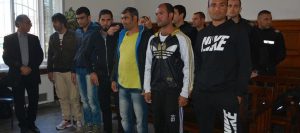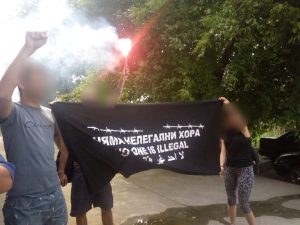Article from comrades from Bulgaria (https://harmanli21.wordpress.com/2018/11/13/four-out-of-21-accused-remain-in-a-closed-door-camp-in-lyubimets-in-connection-with-the-riots-in-harmanli/).
Four out of 21 accused remain in a closed-door camp in Lyubimets, in connection with the riots in Harmanli
Abstract of the court session which took place on 24th and 25th of October 2018 to decide the case of the ones considered as participants in the riots erupted at the largest refugee camp for accommodating people in need of international protection on 24th of November 2018.


The legal proceeding against the accused migrants has finally started. 7 attended out of the 10 that were present at the sessions until recently. It has became clear that three of them have previously asked for reconsidering their detention measures as letting them to go back to Afghanistan. The Court has respected the request and the other three have given a claim of the same kind which has been approved during the session as well. This means that at the moment 4 out the initial 21 accused are continuing to stay in the closed facility of Luybimets. In all likelihood they will struggle to prove their innocence.
During the two days of the judicial proceeding, there were around 30 witnesses of the events from 24.11.2016 testifying the trial. Most of them were representatives of the riot police from Pleven, Plovdiv and Kazanlak. Although some employees of the State Agency for Refugees (SAR), in particular those from the Registration Reception Center (RRC) of Harmanli were also officially summoned, there were no migrants speaking up. The accused themselves were yet not given a voice to share their perspective on the open resistance back in November. Among the police witnesses neither seniors, nor commanders of the police actions during the riots were present. However, according to their statements their commanders were negotiating with some of the protesting migrants but no one could not have said what the gist of the negotiations was. Moreover, none of the police officers was able to clearly state that the accused present in the court hall were direct participants in the riots. Yet, most of the officers have experienced minor injuries.
As already mentioned, the rest of the witnesses were representatives of SAR employed at RRC – Harmanli. In their hearing few things became clear – that the capacity of the camp was seriously exceeded during the days prior to the riots; and that there was an ongoing fuzzy procedure regarding the quarantine due to quite a high degree of delusions coming from the local nationalist political parties. Moving on, and grounded on their words, (pre-)conditions to determine whether or not the camp residents should have been kept in isolation did not exist. Despite, all of them were prohibited to leave the camp premises. Interestingly, the access to the working places of the SAR employees at the RRC was not denied (although the camp was supposedly in quarantine). Thus, they have became unwillingly eyewitnesses to the incident. The SAR representatives could also not claim if some of the present accused migrants was part of the group, 40 – 50 member sized (out of 2 000 – 3 000 migrants accommodated at the reception center, but closed back then; most of them were protesting against the inhumane situation they were put under unlawfully), considered as the main actors who ended in clashes with the police. Lastly, according to the SAR statements, almost all of the camp residents gathered at the ex-parade ground to express discontent in the time of the riots.
Amongst the officially summoned riot’s observers, only one policeman and one employee of SAR (who could be easily mistaken with an employee of another agency called National security), pointed on three of the accused as indirect participants in the riots. According to them, they should be suspected of instigating the others, however, no solid evidence was presented.
After all, the caused damage to the reception center lowers to one common lounge room (where the food was previously given). Some of the policemen have told before the court audience that a damage was also made over the water cannon, most probably caused by makeshift slings. The on-field-officers were pelted with stones and other objects as this was accompanied with obscene gestures and insults such as “Fuck the Police!” and “Open the gates, open the borders!”.
It is important to drawn attention on the fact that by now, in all of the judicial proceedings, the police violence was out of question. It is this physical force that erupted after the end of the riot, and performed in the migrant’s rooms. Some of the official defenders were asked for this, and their response was that the accused did not say anything on the topic. It is more than obvious those appointed defenders do not have any intentions neither to voice the issue, nor to signal the prosecutor.
None of the attendants pleaded guilty to the charge of the accusations. The very few and not persuasive testimonies are partially based on a video recording that we never saw. However, according to the appointed lawyers the recording is of a bad quality, and identification would not really be possible.
Two people supported the migrants by raising a banner, at which the migrants reacted positively.
